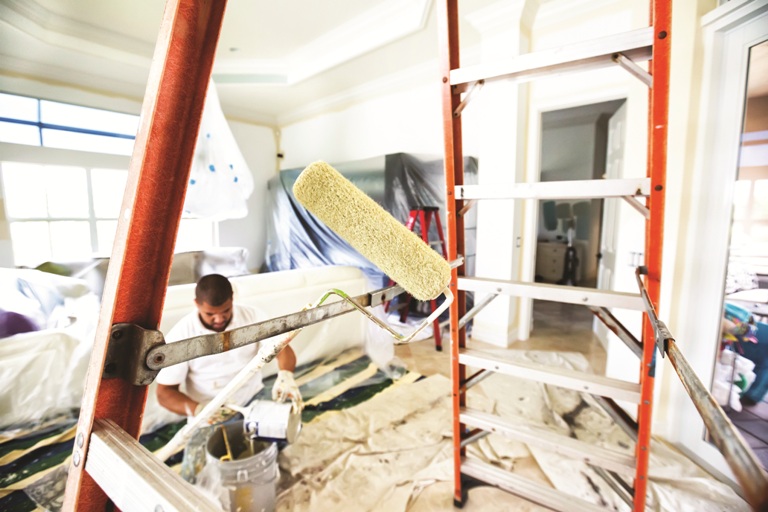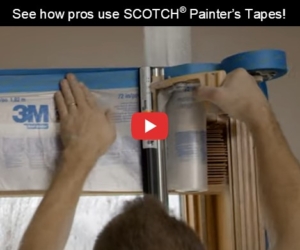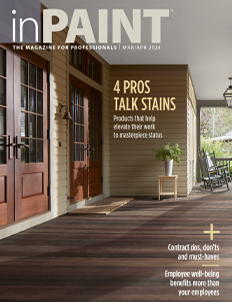Quick Turns
 Quick-turn situations can be found in any business. In the paint world, sometimes there’s an early move-in for a multifamily unit. Or maybe there’s a schedule disruption on a job due to weather or other problems. Regardless, if you’re a paint pro who knows how to pull off quality work—fast—you could enjoy a stream of referrals. There’s no shortage of property managers who would love to pass your name along to others who need quality work done under a tight deadline, says Andrew Propst.
Quick-turn situations can be found in any business. In the paint world, sometimes there’s an early move-in for a multifamily unit. Or maybe there’s a schedule disruption on a job due to weather or other problems. Regardless, if you’re a paint pro who knows how to pull off quality work—fast—you could enjoy a stream of referrals. There’s no shortage of property managers who would love to pass your name along to others who need quality work done under a tight deadline, says Andrew Propst.
Propst is president of both the National Association of Residential Property Managers (NARPM) and Park Place Property Management in Boise, ID. His company oversees about 1,400 multifamily and 800 single-family units. He has a 20-person maintenance crew that can handle just about any type of job for the properties Park Place manages—except repaints.
“If it’s more than two walls, we contract it out … they have the equipment to do it fast and the price is right,” he added. Speed is the ultimate factor though. “Vacancy is the most money lost. If you don’t have a reliable painting vendor, it’s all going to take longer. It’s dollars out of that investor’s and property manager’s pocket every day that a unit is empty.”
Propst and some paint pros recently shared tips for how to find success and stay cool under quick-turn pressure. Not surprisingly, most of the tips dealt with effective communication and creating realistic goals for the job as early as possible. In many cases, some tough early conversations are the building block to a successful and speedy job.
QUARTERBACKING
Organization is the key to turning a unit over quickly. To help him stay organized in a turnover situation, Propst employs a move-out coordinator who sets time lines for inspections and maintenance work following a tenant move out. “Our goal is, no matter what shape the place is in, to turn it around in under a week,” he added. Propst advises painters to get on the same page with the coordinator or property manager on the job, as there are plenty of seemingly minor details to keep in mind; for example, whether carpet is being replaced or not in a unit. “When a painter makes assumptions, that’s where we start to see problems. A lot of times you can avoid those problems if you make the extra phone call,” Propst explained.
Drew Keilt, a commercial sales associate with CertaPro of the Main Line in PA, likes to meet with the property manager or job coordinator as soon as possible. If they need a job done immediately but are slow to follow up, Keilt gets nervous.
Like Propst, Keilt knows that assumptions can kill an estimate and a job. Regardless of the job’s size, walking it with the property manager is critical. “You have to look at every surface you’re painting. You can’t take their word for it over the phone,” he added.
EXTERIORS
For quick exterior turns, Keilt says it’s important to take into consideration the height of the project too. Lifts are a great way to cut time on tall exterior buildings, but they require a crew that knows how to operate them. “Sometimes you might have an outstanding paint crew but it may not have used a lift before; you can get into trouble,” he noted.
Keilt also discusses weather with the property manager for all his exterior jobs, and especially on quick turns. Mother Nature can easily wash away the best-laid plans. Even painting on humid days isn’t worth a failure down the road, he added.
TROUBLE SPOTS, OPPORTUNITY
Unaccounted-for problem areas like rotted wood, drywall damage, and any paint failure requiring extra prep and sanding can slow a job down. “They may tell you, ‘I know a couple areas have some bad spots but they don’t really know … they may be telling you to put two coats on rotted wood,” Keilt added.
Most property managers unaware of trouble spots appreciate being made aware of the situation and are happy to adjust a schedule, if needed. And if your company has a crew member who can do some light carpentry and masonry work, this is the time to pitch the time-savings and expertise your company brings.
“We always have someone who can do some minor carpentry or masonry,” Keilt said. “Even though this pushes the paint job back, it helps so you don’t need to get a general contractor involved, where you may be waiting for them to call and give a go-ahead after the repair. A lot of our customers don’t want to deal with that.”
LET PROS DO WHAT THEY DO BEST
Bill Walloch, general manager at Brad Stoner Painting, Inc. in San Diego, CA, says, “it’s a lot of little factors that add up,” to successfully pull off a quick-turn job. He recommends, if possible, training crews specifically for certain quick-turn situations.
Walloch also pays attention to which crews are better in certain market segments. Some of his crews, for example, are better at office quick turns while others do well with multifamily unit turns. “It’s hard to do more than one thing really well,” he said. “I put my guys into situations where we know they can do the work well and we can make a profit.” Walloch’s hiring practices have also paid off for quick turns. The majority of his painters—the company employs about 25 paint pros—have been with the company a decade or more. Many crews have established routines and developed a job chemistry that allows them to be both flexible and efficient. “Part of the reason I can take a call from someone who asks if I can start a job tomorrow is because I retain a lot of good staff. Typically, I have guys I can move around at the last minute,” he added.
RELATIONSHIPS
Not all quick-turn jobs are worth taking. It may be a case where a new prospect is asking for the impossible and not realizing it, Walloch clarified. His company sees a lot of retail tenant and office suite turns, and some multifamily turns as well. Having established relationships with realistic property managers has helped him succeed under pressure. “It’s about not feeling like you have to work for everybody,” he explained. “I don’t do a lot of quick turns for people I don’t know. But I do a lot of quick turns for repeat customers.”
_____________________________________________________________________________________________
FINDING QUICK-TURN WORK
While quick turns can seem stressful to some, there are those who know how to thrive in those situations. NARPM’s Andrew Propst says property management companies are always on the lookout for a good painting crew.
He recommends qualified painters looking for work attend local chapter meetings for property management groups like the Institute of Real Estate Management (IREM), NARPM, National Apartment Association (NAA) or Certified Commercial Investment Member (CCIM).
“You could be a new paint company with good skills, show up at a meeting, and suddenly have more business than you know how to handle,” Propst said. “We’re always looking for good, legitimate companies to work with.”




